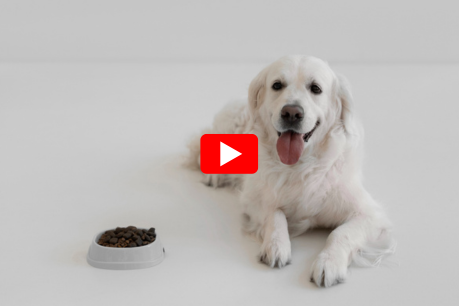Psyllium Husk for Dogs with Diarrhea: A Natural, Safe Remedy
Diarrhea is one of the most common digestive issues that affects dogs at some point in their lives. A wide range of factors, from simple dietary indiscretions to infections, parasites, stress, or underlying health conditions, can cause it.
As loving pet owners, seeing our furry companions uncomfortable and dealing with messy, frequent bowel movements is both distressing and worrying.
When a dog experiences diarrhea, it not only causes discomfort but can also lead to dehydration, nutrient loss, and imbalances in gut flora.
While veterinary care is essential for persistent or severe cases, many pet owners seek natural and safe remedies to manage mild to moderate diarrhea at home.
Psyllium husk helps dogs with diarrhea by absorbing excess water, firming stools, and promoting healthy gut bacteria for better digestion.
One natural remedy that has gained attention for its effectiveness in managing digestive issues in both humans and animals is psyllium husk.
But how does it work for dogs? Is it safe? How should it be administered? This comprehensive blog post will address these questions and more, guiding you through everything you need to know about using psyllium husk for dogs with diarrhea.
What is Psyllium Husk?
Psyllium husk is derived from the outer coating of the seeds of the Plantago ovata plant, native to parts of Asia, the Mediterranean, and North Africa. It’s a soluble fiber that swells up when mixed with water, forming a gel-like substance.
In humans, psyllium husk is widely used as a bulk-forming laxative, helping manage both constipation and diarrhea. It is often found in popular fiber supplements such as Metamucil.
Beyond promoting bowel regularity, psyllium also supports heart health, aids in blood sugar regulation, and contributes to overall digestive wellness.
Interestingly, this fiber supplement has found its way into the pet care world particularly as a gentle, natural way to address canine diarrhea.
How Psyllium Husk Helps Dogs with Diarrhea
Why would a fiber supplement help a dog with diarrhea? It might sound counterintuitive, but soluble fibers like psyllium husk can benefit both constipated and diarrheic animals by regulating the moisture content and consistency of stool. Here’s how it works:
Water Absorption and Stool Bulking
When ingested, psyllium husk absorbs excess water in the intestines, creating a thicker, gel-like substance. This adds bulk to the stool and slows down its passage through the digestive tract.
As a result, stools become more formed and less watery, which is especially beneficial for dogs suffering from loose stools or frequent diarrhea.
Balancing Gut Microflora
Psyllium acts as a prebiotic, feeding the beneficial bacteria in your dog’s gut. These good bacteria help regulate digestion, boost immune function, and compete with harmful microbes that could be causing gastrointestinal upset.
Soothing Irritated Intestines
The gel-like consistency of hydrated psyllium husk provides a protective, lubricating effect in the intestines, reducing irritation and inflammation that often accompanies diarrhea.
Supporting Regular Bowel Movements
By regulating water content and adding bulk, psyllium helps normalize bowel movements — useful for dogs experiencing both diarrhea and constipation episodes due to sensitive stomachs or conditions like irritable bowel syndrome (IBS).
Causes of Diarrhea in Dogs: When Psyllium May Help
Before reaching for psyllium husk, it’s essential to consider what’s causing your dog’s diarrhea. While it’s not a cure-all for every case, it can be very effective for certain common issues:
-
Dietary indiscretions (eating something inappropriate or new)
-
Sudden diet changes
-
Mild bacterial or viral infections
-
Stress-induced diarrhea
-
Food sensitivities or allergies
-
Mild intestinal inflammation
-
Antibiotic-associated diarrhea
However, for serious causes like poisoning, severe infections, or chronic diseases like inflammatory bowel disease (IBD) or cancer, veterinary intervention is crucial.
Is Psyllium Husk Safe for Dogs?
Yes, psyllium husk is generally safe for dogs when administered appropriately. It’s a non-toxic, natural plant fiber with minimal side effects when used responsibly. However, like any supplement, incorrect dosages or improper administration can lead to problems such as:
-
Dehydration (if not enough water is consumed)
-
Bloating or gas (if introduced too quickly or in large amounts)
-
Choking hazard (if dry psyllium powder is inhaled or ingested without fluid)
Always start with small amounts, ensure your dog stays hydrated, and monitor for any unusual reactions.
Proper Dosage of Psyllium Husk for Dogs with Diarrhea
Accurate dosing is crucial to avoid adverse effects and ensure your dog benefits from psyllium husk. While it’s always recommended to consult your veterinarian for personalized advice, general dosage guidelines based on weight are as follows:
-
Small Dogs (Under 25 lbs): ¼ teaspoon of psyllium husk powder mixed with food, once or twice daily.
-
Medium Dogs (25-50 lbs): ½ teaspoon, once or twice daily.
-
Large Dogs (Over 50 lbs): 1 teaspoon, once or twice daily.
Important: Always mix psyllium husk with water or wet food to ensure it hydrates properly before consumption.
How to Administer Psyllium Husk to Dogs
To make it easier for your dog to consume psyllium husk:
-
Mix into Wet Food: Stir the measured psyllium powder directly into your dog’s wet food. This disguises the texture and taste.
-
Create a Slurry: Mix psyllium husk with a small amount of water to form a gel and spoon it over dry food.
-
Incorporate into Dog Treats: Some pet owners prepare homemade dog biscuits with a small amount of psyllium incorporated for regular digestive support.
Always ensure your dog has plenty of fresh water available throughout the day.
How Long Does Psyllium Husk Take to Work for Dogs?
Most dogs experience improvements within 12-24 hours of the first dose. However, this may vary depending on the severity of diarrhea, underlying causes, and individual response.
If diarrhea persists beyond 48 hours, worsens, or is accompanied by symptoms like vomiting, lethargy, or blood in the stool, stop the supplement and consult your veterinarian immediately.
Potential Side Effects of Psyllium Husk for Dogs
When used correctly, side effects are rare. But possible issues include:
-
Dehydration (due to water absorption — counteracted by providing ample water)
-
Gas or bloating (especially if starting with too high a dose)
-
Choking risk (if given dry)
-
Allergic reaction (very rare)
As always, moderation is key, and a gradual introduction is recommended.
Additional Health Benefits of Psyllium Husk for Dogs
While primarily used for managing diarrhea, psyllium husk offers other health perks for canine companions:
-
Helps manage constipation by softening hard stools.
-
Assists in weight management by promoting a feeling of fullness.
-
Supports anal gland health by creating bulkier stools that naturally express glands during defecation.
-
Aids diabetic dogs by slowing glucose absorption and stabilizing blood sugar levels.
When to Avoid Psyllium Husk for Dogs
While psyllium husk is beneficial for many dogs, it’s not suitable in some cases:
-
Severe diarrhea with signs of systemic illness
-
Suspected intestinal blockages
-
Known allergies to psyllium or plantago derivatives
-
Concurrent medications that may have altered absorption with high fiber intake (always consult your vet)
Psyllium Husk vs. Other Natural Diarrhea Remedies
Many pet owners wonder how psyllium stacks up against other home remedies:
-
Pumpkin Puree: Rich in soluble fiber; good for mild diarrhea or constipation.
-
Probiotics: Support gut flora balance; ideal alongside psyllium.
-
Boiled Chicken & Rice Diet: Bland, easily digestible; works well in acute cases.
-
Slippery Elm Bark: Soothes gastrointestinal tract lining.
While all of these have benefits, psyllium’s stool bulking and prebiotic effects make it uniquely effective for watery diarrhea.
Real-Life Testimonials from Dog Owners
Many pet owners have successfully used psyllium husk for managing their dogs’ digestive issues:
Lisa M. from California:
“Our Labrador had recurrent bouts of diarrhea due to food sensitivities. After incorporating a small amount of psyllium husk into his food, his stools firmed up within a day. We now use it during travel and food transitions.”
Tom H. from Texas:
“Our vet recommended psyllium for our senior Beagle who struggled with both constipation and diarrhea. It worked wonders without any side effects!”
Conclusion
Diarrhea in dogs is not just an unpleasant problem for pet owners it can signal underlying issues affecting your dog’s digestive health and overall well-being.
While acute or occasional diarrhea may resolve on its own or with minor dietary adjustments, persistent or severe cases require prompt veterinary attention to rule out serious conditions like infections, parasites, inflammatory bowel disease, or food allergies.
Among the various at-home, natural remedies available for mild to moderate canine diarrhea, psyllium husk stands out as a reliable, gentle, and effective option.
Thanks to its high soluble fiber content, psyllium husk can help normalize bowel movements by absorbing excess water in the intestines, adding bulk to loose stools, and promoting healthy gut flora balance.
References Link
Here’s where we sourced research and expert insights for this article:
.



